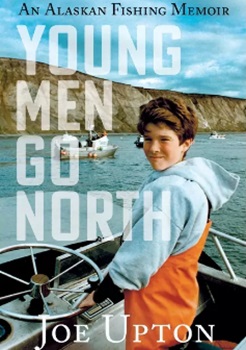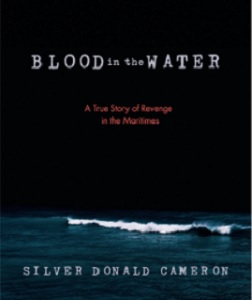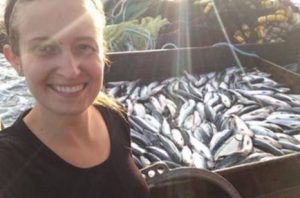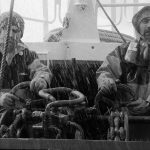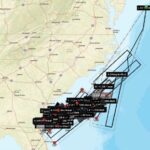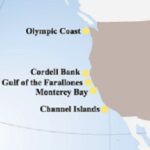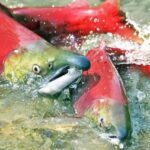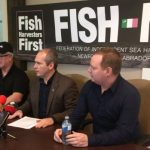Tag Archives: Book Review
‘When the Island Had Fish’ is a portrait of Vinalhaven through its most prominent industry
 Vinalhaven Island sits like a plug between the Gulf of Maine’s offshore gyre and the estuaries, marshes and shallows of upper Penobscot Bay. After the melting of the continental ice sheet 13,000 years ago, these waters became some of the richest fishing grounds on earth. “When the Island Had Fish” tells the story of fish and fishing around Vinalhaven, focusing on the industry’s impact on the people of this singular place. It’s presented as history, garnished with some science and statistics, but at heart, this is an ethnography of a Maine fishing community. Janna Malamud Smith is the participant-observer, and her friends and acquaintances on Vinalhaven, where she summered for 30 years, are her informants. more, >>click to read<< 14:10
Vinalhaven Island sits like a plug between the Gulf of Maine’s offshore gyre and the estuaries, marshes and shallows of upper Penobscot Bay. After the melting of the continental ice sheet 13,000 years ago, these waters became some of the richest fishing grounds on earth. “When the Island Had Fish” tells the story of fish and fishing around Vinalhaven, focusing on the industry’s impact on the people of this singular place. It’s presented as history, garnished with some science and statistics, but at heart, this is an ethnography of a Maine fishing community. Janna Malamud Smith is the participant-observer, and her friends and acquaintances on Vinalhaven, where she summered for 30 years, are her informants. more, >>click to read<< 14:10
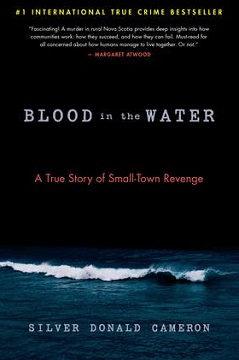
Book Review: “Blood in the Water,” by Silver Donald Cameron
Perhaps you remember the case: “Murder for Lobster,” read headlines around the world, detailing the bizarre and tragic tale of a locally renowned ne’er-do-well who in 2013 was killed by three Nova Scotian lobstermen, sick of the man stealing their lobster traps.,, Isle Madame is a place where neighbors are like family. When a home burns down, the whole community throws a fundraiser. For decades, the community accepted his indecencies. Better to live relatively peacefully, albeit with some big annoyances, than incur Boudreau’s wrath.,, Boudreau was a neighbor. He was also a pest. In Cameron’s telling, his murder poses some big questions about society: Where do we as society draw the line? >click to read< 11:12
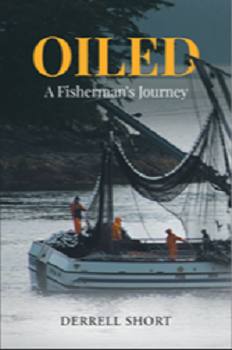
“Oiled: A Fisherman’s Journey” – A deeply personal memoir
Derrell Short, a retired commercial fisherman and handyman, has completed his new book “Oiled: A Fisherman’s Journey”: an exclusive account of the author’s time as a commercial fisherman while raising a family on remote Kodiak Island. It recounts his struggles and experiences while also imparting his unique wisdom that only years of being up against the harsh, yet beautiful landscape of Alaska can provide. As Short states, “In this memoir, various experiences and details are described, including a summary of some of [my] life before and after Alaska, and the trauma and tasks from aiding in cleaning up Exxon’s massive and incompetent oil spill of 1989.” >click to read< 19:35
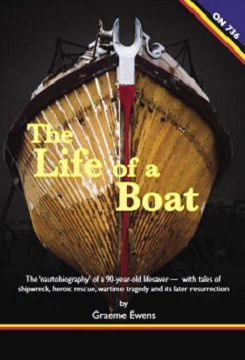
One last rescue: Bid to restore ex-RNLI boat that saved six people on its last call out
More than 90 years ago the RNLI took ownership of its newest vessel, W&S, which would have a dramatic 40-year career and save the lives of six seaman on its last call out. Now, maritime journalist Graeme Ewens is ensuring the life of the W&S is celebrated with the publication of the boat’s ‘nautobiography’ next month. The book details every service conducted by the boat, identifying the casualty vessels and people involved with memories of crew members and survivors. Measuring 45ft 6in, the Watson Cabin class boat was named after her benefactors, Winifred Coode and 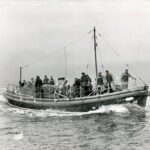 Captain Sydney Webb, when she was brought in to service in February 1931. Among its memorable call outs were several dramatic shipwrecks, including the heroic rescue of the crew from the battleship HMS Warspite, which ran aground in a gale in Mount’s Bay in 1947. >click to read< 09:38
Captain Sydney Webb, when she was brought in to service in February 1931. Among its memorable call outs were several dramatic shipwrecks, including the heroic rescue of the crew from the battleship HMS Warspite, which ran aground in a gale in Mount’s Bay in 1947. >click to read< 09:38
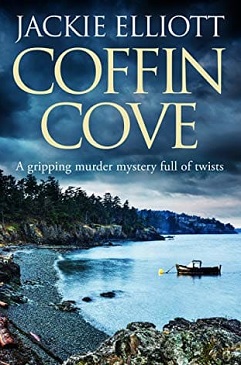
Book Review: COFFIN COVE, By Jackie Elliott. A gripping murder mystery full of twists in a tiny fishing village
Andrea “Andi” Silvers needs a fresh start. Once a star reporter, she’s been dumped by her lover and by the paper,, Andi moves to the tiny fishing village of Coffin Cove on the Vancouver coast, where she lands a job at the local Gazette.,, Two sea lions wash up on the shore. They’ve been shot dead. Activists point the finger at local fishermen. Then things get far worse,,, She is driven to uncover mysteries and expose truths. She’s attracted to local fisherman Harry Brown, and he’s interested in her, but he won’t engage in a casual relationship. It’s all or nothing for him. Harry Brown brews some coffee in the galley, normally drinks his first cup of the day on the stern of his pride and joy, a sixty foot aluminum purse seiner, the Pipe Dream, >click to read< 15:10
Book Review: I got caught by Caught
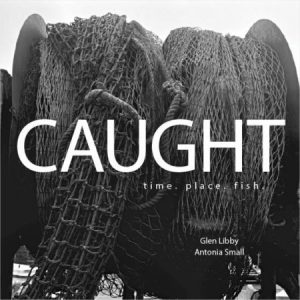 From Tony Small’s first photo and Glen Libby’s first quote, I was hooked by their wonderful book: Caught – Time. Place. Fish. “Changing the world was not as simple as it seemed here in Port Clyde, but a remarkable thing happened…” That’s the first thing I read, and it was so true: this is the story of a truly remarkable achievement in Port Clyde, Maine, one of my favorite places. As Port Clyde’s fishing industry declined, due to the disappearance of shrimp and other species, Glen jumped up and organized the first Community Supported Fishery (CSF) in the nation. The CSF was designed to process and sell the fish and allow fishermen to capture more of the profits. It was not an immediate success. click here to read the story 09:38
From Tony Small’s first photo and Glen Libby’s first quote, I was hooked by their wonderful book: Caught – Time. Place. Fish. “Changing the world was not as simple as it seemed here in Port Clyde, but a remarkable thing happened…” That’s the first thing I read, and it was so true: this is the story of a truly remarkable achievement in Port Clyde, Maine, one of my favorite places. As Port Clyde’s fishing industry declined, due to the disappearance of shrimp and other species, Glen jumped up and organized the first Community Supported Fishery (CSF) in the nation. The CSF was designed to process and sell the fish and allow fishermen to capture more of the profits. It was not an immediate success. click here to read the story 09:38
Book Review: American Dunkirk, The Waterborne Evacuation of Manhattan on 9/11
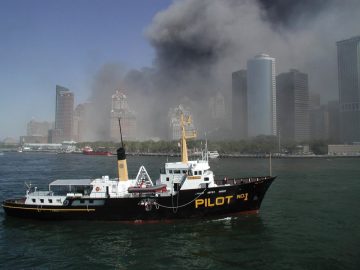 When the World Trade Towers collapsed, as many as a million New Yorkers found themselves trapped on the southern tip of Manhattan. Mass transit was shut down. The bridges and tunnels were closed and a significant portion of Lower Manhattan was shrouded in smoke, ash, and debris from the still burning wreckage of the collapsed towers. Many walked north. As many turned toward the water. Then, through the smoke and drifting ash, something amazing happened. Boats started to arrive along the waterfront to rescue those stranded by the attacks. There were ferries, tugs, dinner boats and fishing boats — craft of all types and sizes. No one, including the U.S. Coast Guard knew what to make of it. Then, the Coast Guard did something equally remarkable. Rather than try to take control or to manage an evacuation that was both unforeseen and far beyond the scope of what anyone could have imagined, they let was happening, happen. The boats arriving were rescuing people, but there were so many to be rescued. They needed more boats. The Coast Guard issued a call over VHF radio for “all available boats.” And the boatlift was on. Read the rest of the review here 12:32
When the World Trade Towers collapsed, as many as a million New Yorkers found themselves trapped on the southern tip of Manhattan. Mass transit was shut down. The bridges and tunnels were closed and a significant portion of Lower Manhattan was shrouded in smoke, ash, and debris from the still burning wreckage of the collapsed towers. Many walked north. As many turned toward the water. Then, through the smoke and drifting ash, something amazing happened. Boats started to arrive along the waterfront to rescue those stranded by the attacks. There were ferries, tugs, dinner boats and fishing boats — craft of all types and sizes. No one, including the U.S. Coast Guard knew what to make of it. Then, the Coast Guard did something equally remarkable. Rather than try to take control or to manage an evacuation that was both unforeseen and far beyond the scope of what anyone could have imagined, they let was happening, happen. The boats arriving were rescuing people, but there were so many to be rescued. They needed more boats. The Coast Guard issued a call over VHF radio for “all available boats.” And the boatlift was on. Read the rest of the review here 12:32






